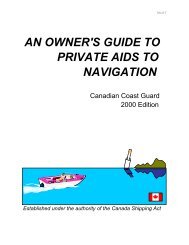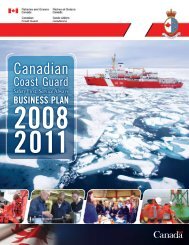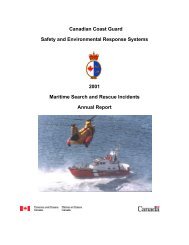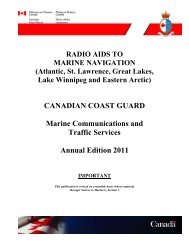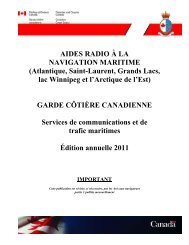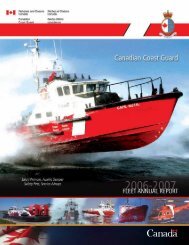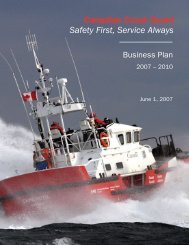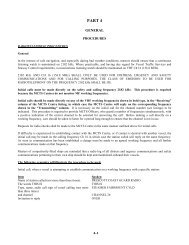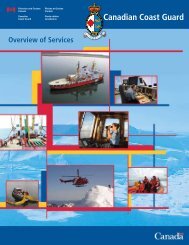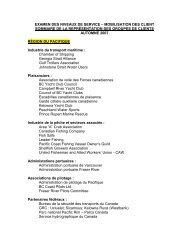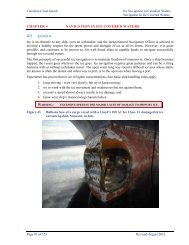RADIO AIDS TO MARINE NAVIGATION - Canadian Coast Guard
RADIO AIDS TO MARINE NAVIGATION - Canadian Coast Guard
RADIO AIDS TO MARINE NAVIGATION - Canadian Coast Guard
Create successful ePaper yourself
Turn your PDF publications into a flip-book with our unique Google optimized e-Paper software.
Operation guidance for masters of ships observing another vessel apparently in danger<br />
7. The following diagram shows suggested procedures for reporting concerns about the safety of another vessel (fire,<br />
smoke, adrift, navigating towards a danger, etc.).<br />
Try to communicate.<br />
Response received ?<br />
Yes<br />
Inform the other ship<br />
about your concern and<br />
try to obtain further<br />
information.<br />
Are you satisfied?<br />
Yes<br />
After verifying that<br />
assistance is not<br />
required, proceed on<br />
passage.<br />
No<br />
No<br />
Try to obtain the<br />
maximum of information<br />
about the other vessel<br />
(name, C/S, type,<br />
position, course, speed)<br />
and inform the JRCC<br />
Sometimes the master of<br />
a vessel in distress does<br />
not immediately contact<br />
the JRCC<br />
Try to keep track of the<br />
reported vessel (radar,<br />
visual and comm's),<br />
unless otherwise directed<br />
by JRCC<br />
Note: For local JRCC contact information, refer to section SEARCH AND RESCUE IN CANADIAN AREAS OF<br />
RESPONSIBILITY (Part 4 of this publication).<br />
False Distress Alerts and Distress Relay Alerts<br />
The GMDSS has been in force for ships on international voyages since February 1, 1999, following its seven-year phasein.<br />
During this time, considerable experience was gained internationally in the operation of the GMDSS. While the<br />
GMDSS has proven its overall effectiveness, the high number of accidental distress alert activations and the inappropriate<br />
and unintended Digital Selective Calling (DSC) distress relay alerts have detracted from the efficiency of the system.<br />
Excessive false alerts and distress relay alerts can create an unnecessary burden and workload for SAR services. They may<br />
also cause confusion and undermine mariner’s confidence in the GMDSS. They could potentially have a serious impact on<br />
real distress situations.<br />
With the aim of minimizing the number of false alerts and distress alert relays, the following information is provided:<br />
• “Instructions for Mariners and Others on How to Cancel a False Alert” (appendix to IMO Resolution A.814(19)<br />
entitled Guidelines for the Avoidance of False Distress Alerts);<br />
• “Procedure for Responding to DSC Distress Alerts by Ships” (COMSAR/Cir.21).<br />
4-19




